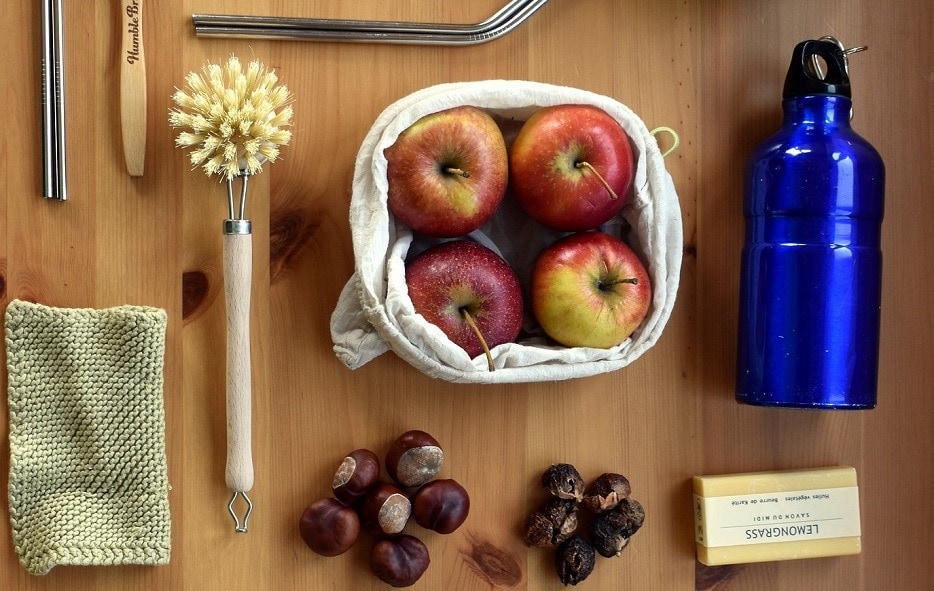4 methods to manage the lack of bulk shop when you target a zero waste lifestyle and one key word: simplicity!
1. Anticipate
In order to avoid waste, no miracles here, you will have to anticipate the way you buy and shop.
Anticipating is also very effective to save money.
As an example for a family working during the week, we would advise to shop groceries only once a week. Thus, evers Saturday, you would prepare a menu for each day of the week and anticipate your family needs by choosing recipes that you can cook in quantities that allow you to have leftovers for lunch the next day.
To avoid waste, choose recipes and menus that would not require any processed products (most of the time coming with packaging that you cannot recycle) and choose recipes requesting very few ingredients (you may find online some recipes with 3 ingredients only, some cookbooks under the theme of minimizing the number of ingredients are also easy to find).
Here is an example of a weekly menu as the proof this is not THAT complicated
Saturday: grocery shopping day:
– Lunch: omelet with ham and cheese and peppers
– Dinner: fish filet with lemon dressing and potatoes OR you may go out to have dinner as you will save money thanks to this new lifestyle.
Sunday:
– Family brunch: eggs, bacon, ham, bread, homemade yogurts, and fresh fruits.
– Dinner: veggie couscous (carrots, turnips, zucchini, etc.) (From which leftovers will be served during lunch on Monday!)
Monday dinner: Rice, chicken, broccoli (leftovers will be served during lunch on Tuesday!)
Tuesday dinner: Tuna and zucchini tart with a salad (you may bake two tarts and save one for Wednesday lunch, the salad dressing can easily travel in a small jam jar).
Wednesday dinner: Spaghetti carbonara (leftovers will be served during lunch on Thursday!)
Thursday dinner: Quinoa and grilled vegetables (such as zucchini, eggplants, peppers) (Here again, leftovers will be served during lunch on the next day!)
Friday dinner: Homemade pizza with ham and mushrooms (No lunch necessary for the next day as it is the weekend! Yay!)
All week breakfasts: enough bread for the week that you may freeze and thaw every morning as well as fruits to be served fresh or squeezed in a juice or smoothie.
Plan also ahead to always have some basic products in your cabinets such as flour, eggs, sugar, chocolate, etc. should you need to bake cookies or deserts from time to time.
Anticipating a menu for the week will force you to write a list and thus to buy only what is necessary for the week. You will not let yourself buy unnecessary products just because of the lovely packaging.
Buying ingredients for your menu significantly helps to save money.
2. Think positive
Trying to see the bright side of everything may sound foolish when we consider the catastrophic situation the overload of waste has created. However, it will tremendously help you in your journey to zero waste!
As you enter in a store, focus on the positive side and on products available with reduced packaging or at least with packaging that may be recycled (paper). Since you’ve planned ahead, it will be easier to avoid feeling frustrated as you have planned the shopping session in advanced based on products available with reduced packaging: basic products often sold in paper bags or fruits and vegetables unpackaged. If you buy meat or fish, visit the butcher in your neighborhood and include him in your challenge, explain to him in a positive way.
3. Do it yourself
This concept goes with anticipating. Cooking will definitely help to avoid processed food and products, often packaged. You then say bye-bye to preservatives, dyes and sugars and welcome to a healthier nutrition with no further effort than using basic ingredients.
If you fear that you will spend too much time in your kitchen, choose simple recipes, with few ingredients. Preparation time will then be no longer than heating processed and prepared products.
This advice is also applicable for non-food products. You may make your own dishwashing product, your own laundry product, your own body peeling, very easily as those homemade recipes usually require the same basic and multi-purpose ingredients (baking soda, vinegar, lemon, castile soap). Money savings are tremendous if you dare giving this method a try on the long term.
4. Be patient
Organizing a zero waste lifestyle cannot happen in a day.
Trust yourself and don’t rush into the process. We have approximated the timing to 6-8 months to get the real benefits of a new organization.
You will first have to target the shops in your area (city/neighborhood) that may provide you with the basic products that we have mentioned earlier. Remember to focus on simple products. At home, you will have to target your family needs and adapt to going grocery shopping only once a week. While shopping, it might take some time (and training) to stop buying what is not on your list!

Of course, you will probably still produce waste in the process and even afterwards, don’t be too harsh with yourself and keep looking for alternatives!
